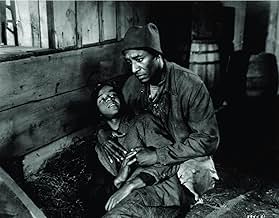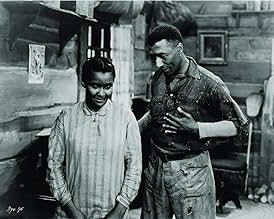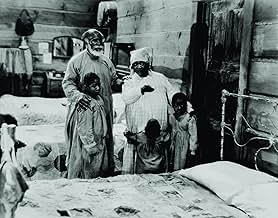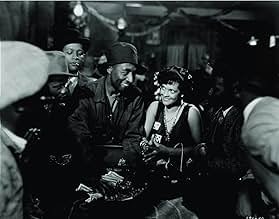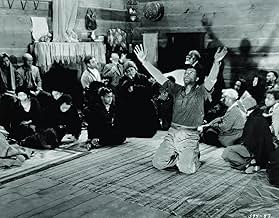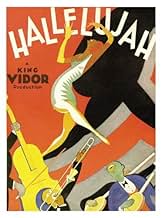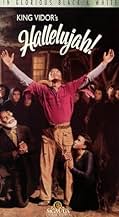VALUTAZIONE IMDb
6,7/10
2081
LA TUA VALUTAZIONE
Aggiungi una trama nella tua linguaA sharecropper decides to become a preacher after falling for a vamp from the city.A sharecropper decides to become a preacher after falling for a vamp from the city.A sharecropper decides to become a preacher after falling for a vamp from the city.
- Candidato a 1 Oscar
- 3 vittorie e 1 candidatura in totale
Matthew 'Stymie' Beard
- Child
- (non citato nei titoli originali)
Evelyn Pope Burwell
- Singer
- (non citato nei titoli originali)
Eddie Conners
- Singer
- (non citato nei titoli originali)
William Allen Garrison
- Heavy
- (non citato nei titoli originali)
Eva Jessye
- Singer
- (non citato nei titoli originali)
Sam McDaniel
- Adam
- (non citato nei titoli originali)
Clarence Muse
- Church Member
- (non citato nei titoli originali)
Trama
Lo sapevi?
- QuizKing Vidor had been hoping to make the film for several years, and jumped at the chance to make it with the advent of sound. He so wanted to produce the picture that he offered to give up his salary.
- BlooperWhen Zeke confronts Chick and Hot Shot and strong-arms them in front of the crowd, the shadow of the microphone falls across Hot Shot as he is pushed to the background of the scene and tries to regain his composure. The shadow of the boom is also visible falling across the extras behind him.
- Versioni alternativeMGM also issued this movie in a silent version, with Marian Ainslee writing the titles.
- Colonne sonoreSometimes I Feel Like a Motherless Child
(uncredited)
Traditional Spiritual
Sung offscreen during the opening credits
Recensione in evidenza
One isn't sure if director King Vidor does more harm than good with the first major film studio sound production featuring an all black cast. While the film marks a progressive first in the industry, negative stereotypes abound. The story (also by Vidor) concerns a family of sharecroppers with the oldest son Zeke as the film's main character. It's a back breaking existence amid orderly squalor but the family retains high spirits in spite of their downtrodden social status.
After picking their cash crop Zeke along with his younger brother Spunk bring it to market to sell. With cash in hand Zeke decides to let off a little steam at a local dive where he is targeted as a rube by Chick a bar room seductress and her accomplice Hot Shot. He is quickly relieved of his cash by the two and things go from bad to worse when Spunk coming to fetch Zeke is accidentally shot and killed. A devastated Zeke turns to preaching and achieves a sizable following when Chick re-enters and diverts Zeke's spiritual vocation back to carnal desire. He once again abdicates his responsibility and runs off with Chick who soon bored with him once again takes up with Hot Shot, this time with disastrous results for all.
Hallelujah is a film of great power filled with scenes of incredible passion. A mass baptism down by a lake featuring hundreds of extras and a Saturday night church revival are riveting and daring in their intensity and energy. The church scene in particular is filmed and recorded with an audacious energy unlike any other from the early sound period. The wildness of this scene does however call into question the depiction of American blacks in the twenties by Hollywood. Segregation was very much a part of the American way back then and for many whites this film may have been their first exposure to black culture beyond jazz which was quickly dominating the country's music scene. In addition Zeke the male lead is portrayed as incapable of holding in check his libido while the female lead Chick is presented as an immoral, shameless, conniver.
In the lead roles Daniel Haynes as Zeke is not much of an actor but he does have an imposing presence and fine baritone voice. Nina Mae McKinney as Chick is a bit over the top most of the time but one has to admire the pluck of her monomania, particularly in one scene where she takes a fireplace poker to Hot Shot, informing him in no uncertain terms that nothing will get in her way of being saved. Fanny Belle DeKnight as Mammy Johnson nobly portrays the family matriarch while Rosa Spivy as Johnson's other love interest suffers with stoic dignity and beatific understanding.
Vidor must be commended for his desire to make this economically unsound project. He was as big as any director in Hollywood (The Crowd, The Big Parade) at the time and he waived his salary to get it made. His insight into black culture is respectful but at times naively heavy handed. With the best of intentions he does stumble along the way but with Hallelujah he presents us with a valuable document about race perception in that period as well as give a segment of uniquely American culture an opportunity and a stage to be more visible. The problem is there is a good deal of negativity to be found in Vidor's sincere and bold effort.
After picking their cash crop Zeke along with his younger brother Spunk bring it to market to sell. With cash in hand Zeke decides to let off a little steam at a local dive where he is targeted as a rube by Chick a bar room seductress and her accomplice Hot Shot. He is quickly relieved of his cash by the two and things go from bad to worse when Spunk coming to fetch Zeke is accidentally shot and killed. A devastated Zeke turns to preaching and achieves a sizable following when Chick re-enters and diverts Zeke's spiritual vocation back to carnal desire. He once again abdicates his responsibility and runs off with Chick who soon bored with him once again takes up with Hot Shot, this time with disastrous results for all.
Hallelujah is a film of great power filled with scenes of incredible passion. A mass baptism down by a lake featuring hundreds of extras and a Saturday night church revival are riveting and daring in their intensity and energy. The church scene in particular is filmed and recorded with an audacious energy unlike any other from the early sound period. The wildness of this scene does however call into question the depiction of American blacks in the twenties by Hollywood. Segregation was very much a part of the American way back then and for many whites this film may have been their first exposure to black culture beyond jazz which was quickly dominating the country's music scene. In addition Zeke the male lead is portrayed as incapable of holding in check his libido while the female lead Chick is presented as an immoral, shameless, conniver.
In the lead roles Daniel Haynes as Zeke is not much of an actor but he does have an imposing presence and fine baritone voice. Nina Mae McKinney as Chick is a bit over the top most of the time but one has to admire the pluck of her monomania, particularly in one scene where she takes a fireplace poker to Hot Shot, informing him in no uncertain terms that nothing will get in her way of being saved. Fanny Belle DeKnight as Mammy Johnson nobly portrays the family matriarch while Rosa Spivy as Johnson's other love interest suffers with stoic dignity and beatific understanding.
Vidor must be commended for his desire to make this economically unsound project. He was as big as any director in Hollywood (The Crowd, The Big Parade) at the time and he waived his salary to get it made. His insight into black culture is respectful but at times naively heavy handed. With the best of intentions he does stumble along the way but with Hallelujah he presents us with a valuable document about race perception in that period as well as give a segment of uniquely American culture an opportunity and a stage to be more visible. The problem is there is a good deal of negativity to be found in Vidor's sincere and bold effort.
I più visti
Accedi per valutare e creare un elenco di titoli salvati per ottenere consigli personalizzati
- How long is Hallelujah?Powered by Alexa
Dettagli
- Tempo di esecuzione1 ora 49 minuti
- Colore
- Proporzioni
- 1.20 : 1
Contribuisci a questa pagina
Suggerisci una modifica o aggiungi i contenuti mancanti



